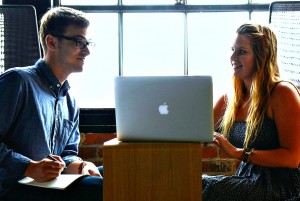Katherine Leary Alsdorf is the founder of The Center for Faith and Work at Redeemer Presbyterian Church in New York City. She co-authored Every Good Endeavor: Connecting Your Work to God’s Work with Tim Keller and currently serves on the board of the Theology of Work Project. Prior to her work with Redeemer, Katherine worked for 20 years in the technology industry.
In this interview, Katherine discusses the best moments of her career, dealing with failure, wrestling with calling and identity, and the most disturbingly sexist remark she’s ever received.
 Thanks to Katrina Roe and Hope 103.2 (Sydney, Australia) for allowing us to share Katherine’s interview here.
Thanks to Katrina Roe and Hope 103.2 (Sydney, Australia) for allowing us to share Katherine’s interview here.
Katherine, you’ve been the CEO of a number of companies. What has been the professional highlight of your career?
I actually didn’t seek to be a CEO, but it happened 3 times. I think the highlight was taking a company that was not functioning well internally and trying to bring an entirely new culture where everyone’s gifts were being recognized and put to use, people were working well together, and we were getting a lot of joy and pride in creating a product that was going to be of significant use to our customers.
How did you approach your career change after you became a Christian?
I can honestly say that it took a very long time for me to figure out what I should be doing distinctively and differently as a Christian. God worked on me a little bit at a time.
In the beginning, I just wanted to not do anything horribly embarrassing to God. So I worked on the little superficial things like my language. But over time, work was a crucible that shaped me, that drew me more to God.

The challenge was often, “How do I love the people who work with me?” —especially when the pressure was on and we were trying to raise money, or if we didn’t get a product out by a certain date, or when a team that said they were going to deliver and they didn’t.
At some point I started a practice of showing up about an earlier and walking from cube to cube, desk to desk, and praying for each person, all 125 people in the company.
God worked on my heart so that I was loving people instead of just using them for the purposes of the company.
I know that at as woman in the high tech industry, you did have some interesting moments. Can you tell us about some times when you encountered sexism?
In 1976, I became part of the aerospace industry. I was working as an economic consultant to NASA, and there weren’t many women at all in that industry. So, yes, there were a number of challenges. I was extremely fortunate to work with a small group of men that invested in me.
But the most dramatic incident occurred on my first business trip without my more senior male colleagues, with our very high level customer from NASA. We were out to dinner, and it was the worst possible thing that could have happened: an extremely beautiful and sexy waitress came up to our table, and she captured my client’s attention. He was just enjoying talking to her and finding out all about her life, and I was sitting there feeling extraordinarily uncomfortable. As she walked away, he said to me, “See her? She’s a fox. You? You gotta make up your mind. Are you gonna be a career woman or a fox? Right now, you’re not doing very well at either.”
How did you respond to that?
I was speechless. I have to tell you, I didn’t know which one I wanted to choose. But I needed the job. So the next morning, I got up, I put my hair in a bun, and I put on the tightest collar and the most man-like tie i could find. And I made the decision to try to be as un-foxlike as possible for the next couple years of my career.

Even though you have had what people would consider an incredibly successful career, you had some really low points as well. One of the lowest points was when the company you were the CEO of went bankrupt. Tell us a little bit about that experience and what you learned.
I took over the CEO role of a company called Pensare from the founder. It was a turnaround, but I felt like God had called me to that, and I had the right experience to try to pull it out. So we worked very hard. At the same time the financial markets for internet companies were collapsing; the internet bubble had burst. We eventually lined up a bunch of buyers, and 18 hours before we were to sign the contract, the buyer backed out. The next Monday morning I had to lay off the entire company. We were done. I was just devastated. I was mad at God. I thought, “Why do you give me things and not let it succeed? I told you I was gonna give you all the glory! Why didn’t it succeed?”
I spent six months wrestling with God, asking, “I really need to understand this calling thing.”
You did have a wonderful moment that you didn’t expect, when you had to deliver the news about what had happened to the company.
There’s no worse moment in my life than standing in front of those people and saying, not only are we done, but I can’t pay you after today, knowing what effect that would have on their lives. There was a horrible dead silence after I gave the news.
Then eventually someone in the back of the room stands up and says, “I just want to give Katherine and her management team a huge round of applause for how hard they’ve worked, for how hard they’ve gotten us to work, and how we almost pulled it off.”
And the entire company stood up and applauded and applauded and applauded. It took quite a while to accept what had happened. The grace that had happened in that moment.
One of my staff came into my office and said, “I know you can’t appreciate how extraordinary what just happened was, but I want you to never forget it, so that you can come back and visit it when you’re ready to accept the love and the grace that was offered there.”
Our work is so often intertwined with our identity. Whether we like it or not, and no matter how much we seek to define ourselves in God, our society does still also define us by what we do. How do we deal with that as Christians?

I definitely enjoyed the identity that went along with the technology business startup world, which is a pretty sexy kind of job to be in. When I left the corporate world to go back to New York from Silicon Valley, to work for a church, I was probably the most concerned about my identity. I was concerned with identity first, income change second, and future third.
There were definitely people that were my friends before that had no interest in me once I decided to work for a church. I wouldn’t be able to get them their next job, so who cares. That’s always startling.
—I think that God was making me more truthful about my idols. Prior to that I’d said, “I’m working in business because God called me here.” But when God called me somewhere else, I found I wasn’t quite as obedient. It cleaned up my internal hypocrisy. I was liking God when he gave me what I wanted. But when he gave me something that wasn’t going to be quite as cool, I was not quite as happy. So it’s been a good refining process.
Should we expect to find meaning and purpose in our work?
We are made to work. God created us in his image. and he gave us a mandate to go out and create culture with all the wonderful resources of this world. And yet a few chapters later in Genesis, because of our rebellion against God, our work became extraordinarily frustrated.
The question of whether we can be expected to find meaning in our work is a tricky one. We were made to do it, and yet it’s going to be hard by definition. The easy answer is that we can’t expect to find easy meaning. But there is a wonderful sense of living out our humanity, our humanness, when we are using our gifts to the benefit of the world that we live in, using our gifts to God’s glory. And there is meaning to overcoming some of the brokenness in the world. Even if we can’t overcome it, sometimes all we can do is stand against it. We can find meaning through any work that we’re doing at any moment in time if we seek God’s purposes for doing that work.

What would you then say to someone who is feeling unfulfilled in their life or in their work and they’re looking to find their purpose or their calling?
In our culture, we too often think it’s a change of job that will make us happier. When in fact it’s a change of how we approach our job. Now that’s not to say that sometimes we’ve selected our job for all the wrong reasons. For example, we’ve selected a job that will pay us more over a job over a job that we would love because we want the things the job can give us as opposed to loving the work itself. In those cases we need to really look at what’s gotten us to this job or some of those things that are burdening us as opposed to leading us to the work that we were built to do and made to do.
Your work with the Redeemer Center for Faith and Work has been a great tool. I know we’re looking at having something like that here. How are you hoping that something like that will help the people of Sydney?
It’s been a fun project to help a church in create a whole series of programs that help people live out their faith more fully in whatever their work is. I’m excited that Sydney is doing that with churches combining their efforts. It has a lot of promise.
We are attempting to help the church itself see itself not just as the church gathered on Sunday for worship. The church is the people working in every institution and culture out there, in the city of Sydney, in the country of Australia.
The hope is to equip people to distinctively work for God’s glory in whatever context God has called us to. When we mobilize all the congregations of all the churches to see themselves as the church—in their place of work—we have the potential to change the culture of workplaces from being self serving to being society serving. We have the opportunity to honor people’s gifts in a way that might not be typical in our contemporary culture. We have the opportunity to value human relationship in a way that often is mechanized—as if we’re just cogs in a wheel making some product or service happen. I think God wants us out there because he has a picture of what our society could be and should be that is so much more glorious than what we experience on a day to day basis.














